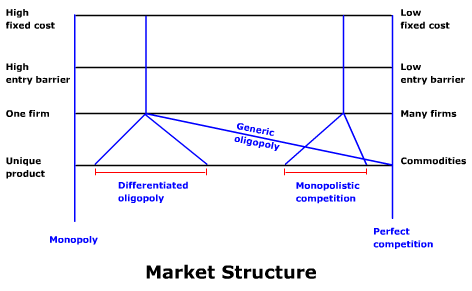Vitamin Inc.
Mature oligopoly with a few large producers of homogeneous commodities is driven to output and price fixing to increase their profit.
The business meeting was over and every scrap of paper chronicling this and earlier meetings was ordered to be burned. Unlike other legitimate business meetings where minutes are carefully kept to ensure accountability, accountability was the last thing that members of this illegal cartel wanted. If compliance to output quotas and price fixing was not completely necessary to sustain the cartel, these meetings might never have been called.
In spite of these attempts to cover up their tracks, members of this nine-year old illegal international vitamin cartel were caught red-handed. They were not back-alley small operators. Instead, the three ringleaders, Roche of Switzerland, BASF of Germany, and Rhone-Poulenc of France together controlled 80% of the world's $3 billion-a-year vitamin market. Through output control and price-fixing, they together with most of the world's smaller producers had jacked up world vitamin prices as much as 25%.
But the penalty for such illegal output and price-fixing was also stiff. Roche agreed to pay $500 million to settle charges with the U.S. Justice Department. BASF agreed to settle similar charges by paying $225 million in fines. Rhone-Poulenc alone escaped punishment for cooperating with the prosecutors. In addition, these companies faced class-action lawsuits from bulk purchasers that bought their vitamins for human and animal consumption. These purchasers included manufacturers of dietary supplements, cereal companies, soft drink companies and chicken farms.
The market for vitamins has all the classic ingredients for oligopolistic collusion. They are homogenous commodities, scale economy leading to a few large producers with excess capacity, and cut-throat competition in a mature market. Since nobody was willing to exit the market to reduce excess capacity, the only way to achieve an acceptable profit margin is to conspire to fix output and prices. Not unexpectedly, Roche, the undisputed leader controlling about 40% of the world vitamin market, was also implicated in an earlier international price-fixing cartel in the food additives of citric acid and lysine. In that earlier 1997 case, Roche was fined $14 million. That a company was willing to repeatedly violate the law despite heavy fines attests to the profitability of fixing price and output or the desperation of mature oligopoly. Without vigilant antitrust enforcement, buyers would have been fleeced.
References:
- New York Times. 5/22/1999. "Roche officers say scandal is a surprise."
- Washington Post. 5/21/1999. "Record fine for vitamin cartel; foreign firms fixed prices, U.S. says."
Glossary:
- oligopolyAn industry dominated by a few large firms. A generic oligopoly sells homogeneous products. A differentiated oligopoly sells differentiated products.

- price fixingCollusion among sellers to set prices which are likely to be higher than those under unrestricted price competition. It is most common and more likely to be successful in product markets with a few dominant major players. Usually, output is restricted to support the higher fixed price. Price fixing is illegal in most countries, but domestic antitrust laws are powerless against price-fixing collusion among sovereign countries, such as OPEC.
- collusionAttempts or agreements among cartel members to restrict output and raise prices.
- cartelCombination of sellers (usually in a generic oligopoly) to control output, price, etc. at the expense of buyers. Cartels that are not sponsored by sovereign states are subject to prosecution under U.S. antitrust laws. OPEC (Organization of Petroleum Exporting Countries) is a prime example of international cartel sponsored by sovereign countries beyond the reach of U.S. antitrust laws.
- commoditiesGoods that are so homogeneous that sellers have little or no pricing power.
Topics:
Keywords
antitrust, BASF, cartel, commodities, homogeneous products, Justice Department, lysine, oligopoly, price fixing, Rhone-Poulenc, Roche, vitamin
